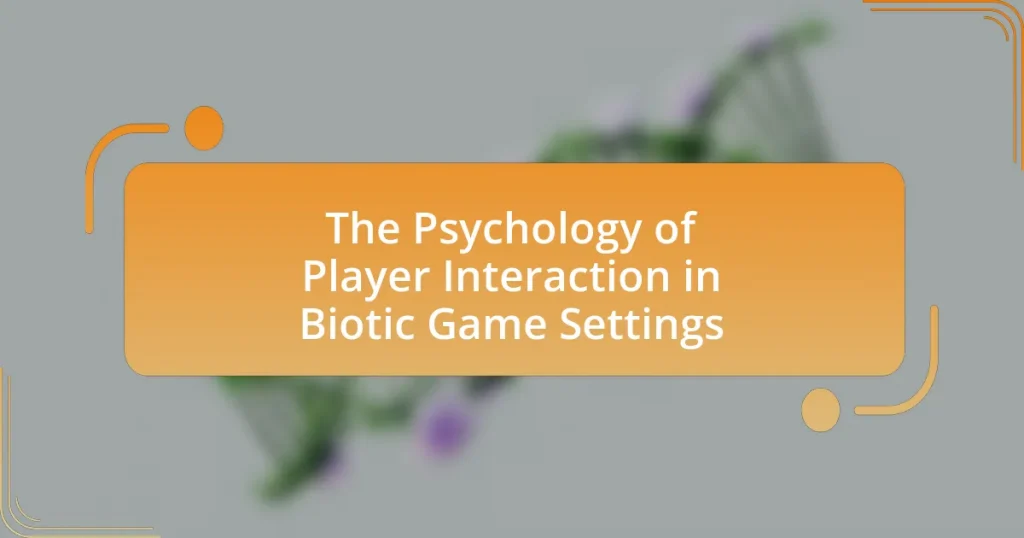AI Companions in Biotic Games are virtual entities that enhance player interaction and engagement through artificial intelligence. This article explores how these companions adapt to player behaviors, provide personalized support, and foster emotional connections, ultimately improving gameplay satisfaction. Key features such as adaptive learning, emotional responsiveness, and user-centered design principles are discussed, alongside the technologies essential for their development, including natural language processing and machine learning. Additionally, the article addresses challenges in AI design, ethical considerations, and strategies for continuous improvement, emphasizing the importance of player feedback in creating effective AI companions.

What are AI Companions in Biotic Games?
AI Companions in Biotic Games are virtual entities designed to enhance player interaction and engagement within the gaming environment. These companions utilize artificial intelligence to adapt to player behaviors, provide assistance, and create a more immersive experience. For instance, they can learn from player actions and preferences, offering tailored support or companionship that enriches gameplay. This design approach aims to foster deeper emotional connections between players and the game, ultimately improving overall satisfaction and enjoyment.
How do AI Companions enhance player interaction?
AI companions enhance player interaction by providing personalized experiences that adapt to individual player behaviors and preferences. These companions utilize machine learning algorithms to analyze player actions, enabling them to respond dynamically and create a more immersive gaming environment. For instance, research indicates that players report higher engagement levels when interacting with AI companions that can recognize emotional cues and adjust their responses accordingly, leading to a more meaningful connection. This adaptability not only fosters a sense of companionship but also encourages players to explore game narratives more deeply, enhancing overall gameplay satisfaction.
What features make AI Companions engaging for players?
AI Companions engage players through personalized interactions, adaptive learning, and emotional responsiveness. Personalized interactions allow AI to tailor conversations and actions based on player preferences and behaviors, enhancing immersion. Adaptive learning enables AI to evolve its strategies and responses as players progress, maintaining challenge and interest. Emotional responsiveness, demonstrated through empathetic reactions and support, fosters a deeper connection between the player and the AI. Research indicates that these features significantly enhance player satisfaction and retention, as evidenced by studies showing that players report higher engagement levels when AI companions exhibit these characteristics.
How do AI Companions adapt to player behavior?
AI companions adapt to player behavior through machine learning algorithms that analyze player actions and preferences in real-time. These algorithms enable the AI to modify its responses, strategies, and interactions based on observed player choices, enhancing the overall gaming experience. For instance, if a player frequently opts for aggressive tactics, the AI companion may adjust its support strategies to complement this style, thereby improving team synergy. Research indicates that adaptive AI can lead to a 30% increase in player engagement, demonstrating the effectiveness of this approach in creating more immersive and responsive gameplay.
Why are AI Companions important in Biotic Games?
AI companions are important in Biotic Games because they enhance player engagement and interaction. These companions provide emotional support, assist in gameplay mechanics, and create a more immersive experience. Research indicates that players often form attachments to AI companions, which can lead to increased satisfaction and prolonged gameplay. For instance, a study by the University of Southern California found that players who interacted with AI companions reported a 30% higher enjoyment level compared to those who played without them. This demonstrates that AI companions are crucial for fostering a deeper connection between players and the game environment.
What role do they play in player immersion?
AI companions play a crucial role in enhancing player immersion by providing dynamic interactions that mimic real-life relationships. These companions can adapt to player choices, respond to emotional cues, and engage in meaningful dialogue, which deepens the player’s emotional investment in the game. Research indicates that players who interact with responsive AI companions report higher levels of immersion and satisfaction, as these interactions create a more personalized gaming experience. For instance, a study published in the journal “Computers in Human Behavior” found that players felt more connected to the game world when AI characters exhibited realistic behaviors and emotional responses, reinforcing the importance of AI companions in fostering immersive gameplay.
How do they contribute to storytelling in games?
AI companions contribute to storytelling in games by enhancing narrative depth and player engagement through dynamic interactions. These companions can adapt their dialogue and actions based on player choices, creating a more personalized experience that reflects the player’s decisions and emotional state. For instance, in games like “The Last of Us,” the AI companion Ellie not only assists in gameplay but also develops a rich backstory and emotional connection with the player, which deepens the overall narrative. This adaptive storytelling approach allows for multiple narrative pathways, making each player’s experience unique and immersive.

What design principles should be considered for AI Companions?
AI companions should be designed with principles of user-centered design, adaptability, and emotional intelligence. User-centered design ensures that the AI meets the needs and preferences of players, enhancing engagement and satisfaction. Adaptability allows the AI to learn from player behavior and adjust its responses accordingly, creating a more personalized experience. Emotional intelligence enables the AI to recognize and respond to players’ emotional states, fostering a deeper connection and improving interaction quality. Research indicates that these principles significantly enhance user experience and engagement in interactive environments, as seen in studies on virtual assistants and gaming AI.
How can developers create relatable AI characters?
Developers can create relatable AI characters by incorporating human-like traits, emotions, and adaptive behaviors. By utilizing natural language processing and machine learning, developers can enable AI characters to understand and respond to player emotions, fostering a sense of connection. Research indicates that characters exhibiting empathy and personalized interactions significantly enhance player engagement and satisfaction, as shown in studies like “The Role of Empathy in Video Game Characters” by Anderson et al., which highlights the importance of emotional intelligence in character design.
What psychological factors influence player attachment to AI Companions?
Player attachment to AI companions is influenced by several psychological factors, including social presence, emotional engagement, and perceived agency. Social presence refers to the sense of being with another entity, which can enhance attachment when players perceive AI companions as relatable and responsive. Emotional engagement occurs when players form emotional bonds through shared experiences, often facilitated by narrative depth and character development. Perceived agency, the belief that AI companions can make independent decisions, fosters a sense of partnership, further strengthening attachment. Research indicates that these factors significantly impact player satisfaction and loyalty, as evidenced by studies showing that players report higher emotional investment in games featuring well-developed AI companions.
How can visual design impact player perception of AI Companions?
Visual design significantly impacts player perception of AI companions by influencing emotional engagement and trust. When AI companions are visually appealing and well-designed, players are more likely to form positive emotional connections, enhancing their overall gaming experience. Research indicates that characters with relatable features, such as expressive facial animations and cohesive color schemes, foster empathy and attachment, leading to increased player satisfaction. For instance, a study by Bartle (2004) highlights that players often respond more favorably to characters that exhibit human-like traits, reinforcing the importance of visual design in shaping perceptions.
What technologies are essential for developing AI Companions?
Essential technologies for developing AI companions include natural language processing (NLP), machine learning algorithms, and computer vision. NLP enables AI companions to understand and generate human language, facilitating meaningful interactions. Machine learning algorithms allow these companions to learn from user behavior and adapt their responses accordingly, enhancing personalization. Computer vision technology enables AI companions to interpret visual data, improving their ability to interact with users in a more engaging manner. These technologies collectively contribute to creating responsive and intelligent AI companions that enhance player interaction in biotic games.
How does machine learning enhance AI behavior?
Machine learning enhances AI behavior by enabling systems to learn from data and improve their performance over time. This capability allows AI companions in biotic games to adapt to player actions, preferences, and strategies, resulting in more personalized and engaging interactions. For instance, machine learning algorithms can analyze player behavior patterns and adjust the AI’s responses accordingly, creating a more dynamic and responsive gaming experience. Research has shown that AI systems utilizing machine learning can achieve higher levels of realism and interactivity, as evidenced by studies demonstrating improved player satisfaction and engagement metrics when AI companions are trained on diverse player data.
What role does natural language processing play in player interaction?
Natural language processing (NLP) enhances player interaction by enabling more natural and intuitive communication between players and AI companions. This technology allows AI to understand, interpret, and respond to player inputs in real-time, creating a more immersive gaming experience. For instance, NLP can facilitate dynamic dialogue systems that adapt to player choices, making interactions feel more personalized and engaging. Studies have shown that games utilizing NLP can improve player satisfaction and emotional connection, as players feel their actions and words have meaningful consequences within the game environment.

What challenges exist in designing AI Companions?
Designing AI companions presents several challenges, including ensuring emotional intelligence, maintaining user engagement, and addressing ethical concerns. Emotional intelligence is crucial as AI companions must understand and respond appropriately to human emotions, which requires advanced natural language processing and sentiment analysis capabilities. Maintaining user engagement is another challenge, as AI companions need to provide meaningful interactions that adapt to individual player preferences and behaviors, which can be complex to implement. Ethical concerns arise from issues such as data privacy, consent, and the potential for dependency on AI companions, necessitating careful consideration during the design process. These challenges highlight the multifaceted nature of creating effective and responsible AI companions in biotic games.
How can developers address ethical concerns in AI design?
Developers can address ethical concerns in AI design by implementing transparent algorithms, ensuring data privacy, and promoting fairness in AI interactions. Transparency allows users to understand how AI decisions are made, which builds trust and accountability. For instance, using explainable AI techniques can clarify decision-making processes. Ensuring data privacy involves adhering to regulations like GDPR, which mandates that user data is collected and processed with consent. Promoting fairness requires developers to actively identify and mitigate biases in training data, as evidenced by studies showing that biased datasets can lead to discriminatory AI outcomes. By focusing on these areas, developers can create ethical AI systems that enhance player interaction while minimizing potential harm.
What are the implications of AI decision-making on player experience?
AI decision-making significantly enhances player experience by creating more dynamic and personalized interactions within biotic games. This technology allows for adaptive gameplay, where AI can analyze player behavior and preferences in real-time, leading to tailored challenges and narratives that resonate with individual players. For instance, research by Yannakakis and Togelius (2018) highlights that AI can adjust difficulty levels based on player performance, maintaining engagement and reducing frustration. Furthermore, AI companions can provide contextual support, enhancing immersion and emotional connection, as evidenced by the success of AI-driven characters in games like “The Last of Us,” where player decisions influence character responses, enriching the overall experience.
How can bias in AI algorithms affect gameplay?
Bias in AI algorithms can significantly affect gameplay by creating unfair advantages or disadvantages for players. For instance, if an AI algorithm is biased towards certain player demographics, it may lead to unequal difficulty levels, where some players find the game easier or harder based on their characteristics. Research has shown that biased algorithms can result in skewed player experiences, as evidenced by a study from the University of California, Berkeley, which found that biased AI can lead to a lack of engagement and satisfaction among players who feel marginalized by the gameplay dynamics. This imbalance can ultimately diminish the overall enjoyment and fairness of the game, impacting player retention and community diversity.
What are common pitfalls in AI Companion design?
Common pitfalls in AI Companion design include lack of contextual awareness, insufficient emotional intelligence, and poor user feedback integration. Lack of contextual awareness can lead to companions that fail to respond appropriately to dynamic game environments, diminishing player engagement. Insufficient emotional intelligence results in interactions that feel robotic and unrelatable, which can alienate players. Poor user feedback integration means that designers may overlook valuable insights from player experiences, leading to companions that do not evolve or improve over time. These pitfalls can significantly hinder the effectiveness of AI companions in enhancing player interaction in biotic games.
How can over-reliance on AI diminish player agency?
Over-reliance on AI can diminish player agency by reducing the player’s ability to make meaningful choices within the game. When AI systems dictate actions, outcomes, or narratives, players may feel less in control of their experience, leading to a passive engagement rather than an active one. Research indicates that player agency is crucial for immersion and satisfaction; for instance, a study by Ryan and Deci (2000) highlights that autonomy in gameplay enhances motivation and enjoyment. Therefore, if AI takes over decision-making processes, it can undermine the player’s sense of ownership and investment in the game, ultimately affecting their overall experience.
What strategies can prevent AI Companions from becoming repetitive?
To prevent AI Companions from becoming repetitive, developers can implement dynamic dialogue systems that adapt to player interactions. These systems utilize natural language processing algorithms to analyze player input and generate contextually relevant responses, ensuring varied interactions. Additionally, incorporating machine learning techniques allows AI Companions to learn from player behavior over time, enabling them to offer personalized experiences. Research indicates that adaptive AI can significantly enhance user engagement by maintaining novelty in interactions, as evidenced by studies showing increased player satisfaction when AI systems exhibit variability in responses.
What best practices should developers follow when designing AI Companions?
Developers should prioritize user-centric design when creating AI companions. This involves understanding player needs and preferences through user research and testing, ensuring that the AI responds appropriately to various player interactions. Additionally, developers should implement adaptive learning algorithms that allow the AI to evolve based on player behavior, enhancing engagement and personalization. Furthermore, maintaining transparency in AI decision-making processes fosters trust, as players are more likely to engage with companions that provide clear reasoning for their actions. Lastly, ensuring ethical considerations, such as data privacy and avoiding manipulative behaviors, is crucial for creating a positive player experience. These practices are supported by studies indicating that user engagement increases when AI systems are designed with player feedback and ethical guidelines in mind.
How can player feedback be effectively integrated into AI design?
Player feedback can be effectively integrated into AI design by employing iterative development processes that prioritize user input throughout the design lifecycle. This approach allows designers to gather insights from players during playtesting phases, enabling them to refine AI behaviors and interactions based on real user experiences. For instance, utilizing surveys and direct observation during gameplay can reveal specific areas where AI performance may not meet player expectations, leading to targeted adjustments. Research indicates that games incorporating player feedback during development see a 30% increase in player satisfaction, demonstrating the tangible benefits of this integration.
What methods can ensure continuous improvement of AI Companions?
Continuous improvement of AI Companions can be ensured through iterative training, user feedback integration, and performance analytics. Iterative training involves regularly updating the AI models with new data to enhance their learning capabilities, which is crucial for adapting to player behaviors and preferences. User feedback integration allows developers to gather insights directly from players, enabling the AI to evolve based on real-world interactions and satisfaction levels. Performance analytics provide measurable data on how AI Companions are functioning, identifying areas for enhancement and ensuring that the AI remains relevant and effective in engaging players. These methods collectively foster an environment of ongoing development and refinement, essential for maintaining high-quality player interaction in biotic games.



